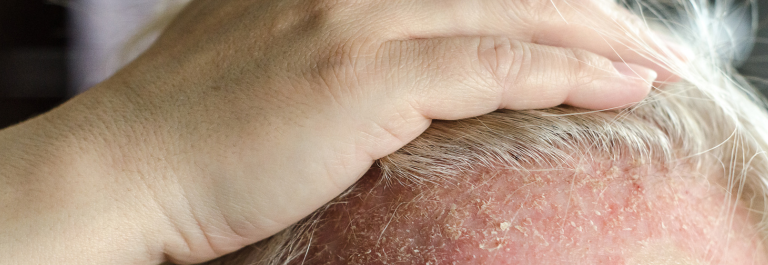Have you experienced an itchy, scaly scalp that just won't be soothed? Had flaky skin on your head that dandruff shampoo can't solve? It could be that you have scalp psoriasis, a condition that affects millions of Americans.
In this article, we will cover:
-
What is scalp psoriasis?
-
Symptoms and causes of scalp psoriasis
-
Scalp psoriasis treatments and prevention
Read on as we discuss all you need to know about psoriasis of the scalp.
What is Scalp Psoriasis?
Psoriasis is an autoimmune condition characterized by thick patches of discolored, dry, scaly skin called plaques. It can often cause intense itching and flaking of the skin. When found on the scalp, it is known as scalp psoriasis.
It is estimated that 80% of people with psoriasis will experience psoriasis plaques on their scalp over the course of the disease. While it is unusual for psoriasis to be localized only to the scalp, it is possible. Someone will likely experience psoriasis on multiple parts of their body simultaneously.
While psoriasis is chronic, it is not contagious. Therefore, psoriasis cannot be spread from person to person.
Symptoms of Scalp Psoriasis
Psoriasis on the scalp can be recognized by the following characteristics:
-
Pink or reddish patches with white scales on lighter skin, purple with silver-gray scales on darker skin tones
-
Dry skin on the scalp, often with dandruff like flaking
-
Itching
-
Burning or painful skin
-
Hair loss due to scratching or picking at the skin of the scalp
These symptoms can affect the entire scalp or be localized to a few areas of the scalp. The patches can also spread onto the forehead, down the neck, or even into the ears.
Types of Scalp Psoriasis
Mild Scalp Psoriasis
Cases of mild scalp psoriasis tend to be manageable through topical treatments and are sometimes even unnoticeable to others.
Severe Scalp Psoriasis
In severe scalp psoriasis, plaques may cover large parts or even the entire scalp. More severe cases tend to last longer and be more resistant to treatment. Scalp psoriasis may cause intense itching, which may lead to temporary hair loss from consistent scratching of the scalp. Scratching can also break the skin, leading to crusty sores on the scalp that can become infected.
Causes of Scalp Psoriasis
Psoriasis is an autoimmune condition, meaning the immune system attacks itself. It impacts the growth of skin cells. The average person's skin cells turn over every 28 to 30 days. On the other hand, people with psoriasis grow new skin cells every three to four days. This causes a build-up on the skin's surface, leading to the tough, scaly patches that characterize psoriasis.
It is unknown exactly what causes psoriasis, but it is thought there are genetic and environmental factors. These factors include:
-
Bacterial infections
-
Injury to the skin
-
Soaps/skincare products with harsh chemicals, detergents, or fragrances
-
Hormonal changes (i.e., puberty, pregnancy)
-
Obesity
-
Overexposure to the sun
Prevent Scalp Psoriasis
While psoriasis is a chronic condition that cannot be cured, many things can be done to prevent recurring cases of scalp psoriasis. These include:
-
Keeping the scalp clean and moisturized
-
Quitting smoking
-
Avoiding alcohol
-
Eating a balanced diet rich in anti-inflammatory foods like leafy greens (i.e. kale and spinach), olive oil, and oily fish (i.e. salmon, mackerel)
-
Maintaining a healthy weight
-
Limiting stress
-
Avoid wearing hats or hair coverings to allow your scalp to breathe
How Do I Know if I Have Scalp Psoriasis?
Having psoriasis on the scalp can be mistaken for other skin disorders, such as seborrheic dermatitis (dandruff), eczema, or a fungal infection. If you suspect that you have psoriasis - on the scalp or anywhere else on the body - it can be helpful to speak with a doctor or dermatologist who can diagnose scalp psoriasis. They will likely do an examination, discuss your symptoms of scalp psoriasis, and take a family history.
How to Treat Scalp Psoriasis At Home
Use a Soothing Soap
The first line of defense for treating scalp psoriasis or preventing a flare-up is using a natural soap to keep the scalp clean. Harsh detergents often found in regular shampoos can aggravate psoriasis, so by using a gentle cleanser like the Coconut and Sunflower Oil Bar, you can purify the skin of the scalp without stripping its natural oils. Coconut oil is especially soothing to psoriasis of scalp because it is anti-inflammatory. Bonus: you can use this soap all over the body, no matter how delicate the skin surface!
Moisturize, Moisturize, Moisturize
Using a soothing, rich balm on patches of psoriasis keeps the skin moisturized and, therefore, less itchy. The Organic Manuka Honey Skin Soothing Cream is designed especially for people with psoriasis and other skin conditions requiring extra TLC. It has just six natural ingredients so that it won't antagonize the delicate skin of the scalp. When experiencing a scalp psoriasis flare-up, it's best to moisturize the affected area several times daily.
Try Baking Soda
Baking soda is known to reduce inflammation and itchiness of scalp psoriasis. Mix baking soda with a small amount of water to create a paste. Apply the paste to the affected areas of the scalp and leave it on for five to ten minutes. Ideally, you should do this several times a day. Not only does this soothe the irritation, but it also helps to exfoliate the scalp.
When to Seek Medical Treatments
You can use many products for treating scalp psoriasis if more natural remedies are not working. Treatment for scalp psoriasis is highly individualized and dependent on the severity of the skin condition. Some other treatments that are commonly used include:
-
Medicated shampoos such as coal tar shampoo and salicylic acid shampoos
-
Topical treatments such as topical steroids
-
Oral medications that slow the growth of new skin cells
It is especially important to seek treatment for signs of infection on the scalp, such as excessive swelling, bleeding, or pain.
Find Relief from Scalp Psoriasis
While scalp psoriasis can be an uncomfortable condition, there is no need to worry. Try our tips to discover soothing scalp psoriasis relief today!










